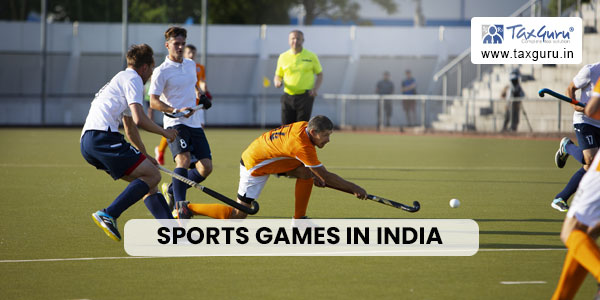Discover the legality of fantasy sports games in India, exploring court judgments and the skill element involved. Get insights into GST liability and the legal status of platforms like Dream11.
This article intends to examine and understand the legality of fantasy sports games in India and whether the activities of the participants as well as the platform constitute gambling, betting or wager.
To discourage gambling across the nation and govern public gambling, the Public Gambling Act, 1867 was enacted. After the Constitution of India was promulgated, ‘betting and gambling’ appeared as Entry 34 of List II-State List of the Seventh Schedule. Thus, gambling being a state subject, every state developed its own regulation after assimilating the basic principles of the Act of 1867. This has led to disparate laws governing gambling and betting in each state which have to be examined individually to determine lawfulness of any gaming activity in that territory. While most of the states have prohibited gambling and betting with certain exceptions, various types of gambling have been legalised by Daman, Goa and Sikkim.
Although fantasy sports have become all the rage in recent times because of the allure of making a quick buck, it is not a new concept. The origin of fantasy games can be traced back to the 19th century. A fantasy sport game is a game where participants decide the composition of virtual teams by selecting real players or athletes of their chosen professional sport. These virtual teams are pitted against each other on a virtual platform that hosts contests that participants can enter into after paying an entry fee. Thus, the participant essentially operates in the capacity of a selector and team manager. The performance of these virtual teams is then evaluated on the basis of real-life performance of the athletes constituting the team.
The Federation of Indian Fantasy Sports (FIFS) was founded as the Indian Federation of Sports Gaming (IFSG) in 2017. FIFS is a self-governing body that acts as a regulator of fantasy sports in India. Some of the members of FIFS are Dream11, Fantasy Akhada, and Khelo Fantasy Live. One of the conditions mentioned in the FIFS charter is that all paid contests offered by a fantasy sports platform have to be skill predominant and winning outcome should showcase knowledge and skill of participant in relation to other participants.

In 2017, in a writ petition filed in the Hon’ble High Court of Punjab and Haryana [Varun Gumber v. Union Territory of Chandigarh & Others, CWP No. 7559 of 2017, decided On, 18 April 2017] it was alleged that illegal gambling activities were being carried out by the now popular platform Dream11. The court examined various aspects of the how Dream11 operates and the role of a participant player paying entry fees. Public Gambling Act 1867 while laying down the law regarding public gambling and keeping of common gaming houses states that the provisions of the act do not apply to games of ‘mere skill’ (section 12). The court stated that a participant in a contest on Dream11 had to study and evaluate the strengths and weaknesses of athletes available for selection. This required skill. The expression ‘mere skill’ was interpreted to mean ‘substantial skill or preponderance of skill’ and that skill constituted a game where skill of player dominated over the element of luck.
Article 19(1)(g) of the Constitution of India gives right to all citizens ‘to practise any profession, or to carry on any occupation, trade or business’. Gambling, not being a profession, occupation, trade or business, is not afforded the protection of said article. However, Dream11 being a company not engaged in gambling activity (being a game of skill and not chance) was a business with due registration and, would be protected by Article 19(1)(g). Thus, it was found that Dream11 does not constitute activities either on part of the platform or on part of the participant that could be construed as gambling or betting and the writ petition was dismissed vide order dated 18th April, 2017. A Special Leave Petition challenging order of the Hon’ble High Court of Punjab and Haryana was filed before the Hon’ble Supreme Court, but was dismissed.
In addition to whether operations of Dream11 constitute gambling or betting, another question regarding GST liability of the company was raised in a PIL filed in the Bombay High Court [Gurdeep Singh Sachar v. Union of India [CPIL Stamp No. 22/ 2019]].
Upon entering contests by paying entry fees, participants receive a tax invoice in which tax is charged on the amount retained by the platform as commission which is 20% of the total sum staked by the player. The balance 80% of the amount is not taxed as it is kept in a separate escrow account meant for ultimate distribution amongst the contest participants. The point of contention was that if the gaming activity in question constituted gambling or betting, Rule 31A(3) of CGST Rules, 2018 was applicable and GST would have to be charged on 100% of the amount collected.
To understand whether Rule 31A(3) of CGST Rules, 2018 would apply, let us first look at section 7(2) of the CGST Act, 2017 – Scope of Supply:
“…Notwithstanding anything contained in sub-section (1),
(a) activities or transactions specified in Schedule III; or
(b) such activities or transactions undertaken by the Central Government, a State Government or any local authority in which they are engaged as public authorities, as may be notified by the Government on the recommendations of the Council,
shall be treated neither as a supply of goods nor a supply of services.”
Excerpt of Schedule III (Activities or Transactions which shall be treated neither as a Supply of Goods nor a Supply of Services) referred to in the above section is reproduced below:
“…6) Actionable claims, other than lottery, betting and gambling.”
The judgement stated that the amount pooled into the Escrow account was an ‘actionable claim’ as it was ultimately meant for distribution among winning participants and fell under Entry 6 of Schedule III. Such actionable claim was to be treated neither as supply of goods or supply of services and would therefore be exempt from GST levy. Thus, it was outside the purview of Rule 31A(3) of the CGST Rules, 2018. This order of Bombay High Court was challenged before Hon’ble Supreme Court in a Special Leave Petition which was dismissed.
Relying on these pronouncements by the Punjab and Haryana High Court and Bombay High Court, PIL filed before Rajasthan High Court [Chandresh Sankhla v. State Of Rajasthan, 2020 SCC OnLine Raj 264, decided on 14-02-2020] claiming that general public was being cheated by use of Dream11 app and were unwittingly culprits of gambling and betting was dismissed.
Conclusion:
The legality of fantasy sports games in India and whether they constitute gambling, betting, or wagering have been examined and addressed by various courts. The courts have taken into consideration the skill element involved in fantasy sports and the distinction between games of skill and games of chance.
The High Courts of Punjab and Haryana, Bombay, and Rajasthan have all ruled in favor of fantasy sports platforms like Dream11, stating that they do not involve gambling or betting. These judgments emphasize that fantasy sports require skill and knowledge in selecting and managing virtual teams based on the real-life performance of athletes.
The courts have interpreted the Public Gambling Act, 1867, and relevant provisions of the Constitution of India to determine that fantasy sports platforms operate within the realm of skill-based activities. The protection of Article 19(1)(g) has been extended to fantasy sports platforms as legitimate businesses.
Furthermore, the issue of GST liability on fantasy sports platforms has also been addressed. The courts have held that the amounts collected by platforms as entry fees, which are subsequently distributed among winning participants, qualify as ‘actionable claims’ and are exempt from GST as per Schedule III of the CGST Act, 2017.
Based on these court rulings, it can be concluded that fantasy sports games, such as those offered by Dream11, are lawful activities in India and do not fall under the purview of gambling or betting. The recognition of skill and the absence of chance as the predominant factor have contributed to the legal status of fantasy sports platforms.
*****
Disclaimer: The information provided in this article is based on court judgments and should not be construed as legal advice. Individuals are advised to consult with legal professionals for specific legal guidance regarding the operation and participation in fantasy sports games in India.





